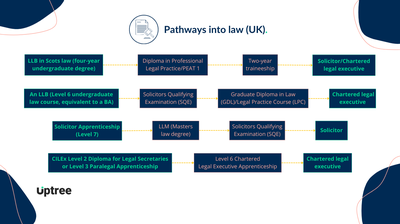
Law
The legal profession is divided into two main branches – solicitors and barristers. There are hundreds of different types of law. At the simplest level, you can divide lawyers between those doing commercial work (i.e. work for companies) and those involved with individual people.

-
Useful skills
- Commercial awareness
- Attention to detail
- Communication skills
- Teamwork
- Information analysis and research
- Organisation
- Creative problem solving
-
Related subjects
- English
- History
- Maths
- Economics
- Languages
- Law
Explore the pathways to get into law
-
Apprenticeship
To become a paralegal, you could take:
- Paralegal Level 3 advanced or foundation/modern apprenticeship
This usually takes 2 years to complete as a mix of workplace learning and study.
You'll usually need:
- Employers will set their own entry requirements
To qualify as a solicitor, you could do:
- solicitor degree or graduate apprenticeship
This route usually takes around 5 to 6 years and you'll need your employer's support to do it.
You'll also need to take the SQE, demonstrate relevant work experience and meet character and suitability to practice.
You'll usually need:
- Employers will set their own entry requirements
-
College
For positions in administrative support for lawyers, you could take:
- audio transcription course
- legal word processing course
- Level 3 Diploma for Legal Secretaries
You'll usually need:
- 4 or 5 GCSEs at grades 9 to 4 or National 5s at grades A to C, or equivalent, for a level 3 course
-
University
In order to qualify for a solicitor, you must:
- take an undergraduate degree or equivalent qualification, in any subject
- pass part 1 and 2 of the Solicitors Qualifying Exam (SQE)
- complete 2 years (or equivalent if part-time) qualifying work experience
- meet the character and suitability requirements of the Solicitors Regulation Authority (SRA)
Though your degree does not have to be in Law, you will need some legal knowledge to pass the SQE.
To study Law at some universities you'll need to pass the Law National Aptitude Test (LNAT).
You'll usually need:
- 3 A levels or equivalent
To become a paralegal, you could study for:
- foundation degree
- higher national diploma or degree in law
- legal studies or paralegal practice
It's competitive to get a place on a law degree, so you'll need to have good grades when you apply.
You'll usually need:
- 1 or 2 A levels, Scottish Highers, or equivalent, for a foundation degree or higher national diploma
- 2 to 3 A levels, Scottish Highers or equivalent, for a degree
-
Work
Solicitor:
You could start with a legal firm and do on-the-job training like the Chartered Institute of Legal Executives (CILEX) Level 6 Professional Diploma in Higher Law and Practice.
You would then need to:
- pass parts 1 and 2 of the Solicitors Qualifying Exam (SQE)
- show you have 2 years of qualifying work experience, or equivalent if part time
- meet the character and suitability requirements of the Solicitors Regulation Authority (SRA)
Paralegal:
You might be able to find work with a legal practice as an admin assistant and do training on the job to qualify.
You can get training through the Institute of Paralegals or the National Association of Licensed Paralegals.
You'll be expected to have:
- GCSEs or National 5s, or A levels or Scottish Highers, and a good standard of English.
Explore online careers courses
Browse upcoming events
Jobs in law
Check out live jobs and placements

Uptree partner companies in law

Did you know?
This is one of the most long-established professions. The importance of lawyers dates back to ancient Greece.